Departmental news
WMG key partner in a £5.4 million project to develop UK battery supply chain for high performance, low carbon vehicles
 WMG, University of Warwick, was recognised as the Advanced Propulsion Centre UK spoke for Electrical Energy storage in 2015, and it has been announced that WMG is to be a key partner in £5.4 million project to develop the next generation of battery packs for high performance, low carbon vehicles.
WMG, University of Warwick, was recognised as the Advanced Propulsion Centre UK spoke for Electrical Energy storage in 2015, and it has been announced that WMG is to be a key partner in £5.4 million project to develop the next generation of battery packs for high performance, low carbon vehicles.
The UK Automotive Battery Supply Chain project aims to exploit the world leading UK innovations in the area of battery technology. Currently most of the technology within the battery systems used by the UK automotive industry is sourced from overseas suppliers, so this project aims to capitalise on the UKs strong battery technology research base and bring production back to the UK to serve demand from a changing automotive industry as they drive to deliver innovative ways to reduce carbon emissions and improve performance.
Partnership to power up new 30% cheaper battery technology for solar storage
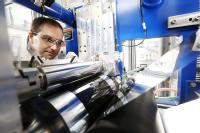 Researchers at WMG, University of Warwick have formed a new research partnership with battery technology innovators Faradion, and smart energy storage specialists Moixa Technology, to develop sodium-ion cells as a significantly lower cost alternative to lithium-ion batteries for solar energy storage. This collaboration is being part funded by Innovate UK, the UK’s innovation agency.
Researchers at WMG, University of Warwick have formed a new research partnership with battery technology innovators Faradion, and smart energy storage specialists Moixa Technology, to develop sodium-ion cells as a significantly lower cost alternative to lithium-ion batteries for solar energy storage. This collaboration is being part funded by Innovate UK, the UK’s innovation agency.
A significant proportion of the cost of current solar energy storage systems comes from the commonly used lithium-ion battery. However by using highly abundant sodium salts rather than lithium, Sodium-ion cells are anticipated to be 30% cheaper to produce. This makes solar storage more accessible and opening up the possibility of domestic renewable energy storage to a greater number of households and businesses worldwide. Developments in this area could lead to a CO2 reduction of 500,000 tonnes each year.
New Professor of Power Electronics Joins WMG
 WMG is proud to announce the arrival of Professor Richard McMahon who joins from Cambridge University.
WMG is proud to announce the arrival of Professor Richard McMahon who joins from Cambridge University.
As WMG’s first Professor of Power Electronics, Professor McMahon will set up and lead a power electronics research group widening WMG’s Energy and Electrical Systems research. He will bring with him his team from Cambridge, and a wealth of knowledge in power electronics, especially using wide band-gap devices, and their application in the automotive sector, energy use and storage, power distribution and renewable generation from both wind and wave power.
Professor McMahon comments: “Power electronics is a relatively new area of research for WMG, and I’m looking forward to using my expertise to help to grow and expand the existing Energy and Electrical Systems research.”
WMG plays key role in £20 million announcement backing British Automotive battery manufacturing
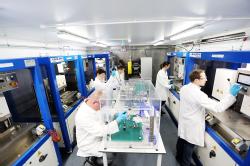 WMG at the University of Warwick are delighted to be part of a £19.4m project to support the development of next-generation electric vehicle batteries in the UK, funded through the Advanced Propulsion Centre (APC UK Ltd).
WMG at the University of Warwick are delighted to be part of a £19.4m project to support the development of next-generation electric vehicle batteries in the UK, funded through the Advanced Propulsion Centre (APC UK Ltd).
The funding will support leading edge manufacturing research focussed around Nissan's Sunderland battery manufacturing plant - the largest full scale automotive Li-ion battery manufacturing facility in Europe. WMG researchers will play a key role in helping Nissan take forward this opportunity and will receive £1m for the research.
The consortium led by Nissan with WMG at the University of Warwick, Hyperdrive, Newcastle University, and Zero Carbon Futures (ZCF), will bring together engineers, researchers, new technology and existing facilities, assets and knowledge to create and prove new and improved manufacturing processes for the next generation of automotive batteries.
WMG has particular skills around battery chemistry and the manufacturing processes used to scale this up to high volume production. WMG role in the project will be to investigate potential improvements to battery chemistry and increasing manufacturing yield, and to optimise automated manufacturing processes to enable Nissan to remain at the forefront of electric vehicle technology.
£180m Midlands investment as government confirms funding for the energy research accelerator
£60m of Government funding for the Energy Research Accelerator confirmed by Government in the Spending Review supported by a further £120m investment by industry and universities.
- Research will transform UK expertise in energy storage, thermal energy and energy efficiency.
- Six Midlands Innovation Universities and the British Geological Survey welcome £180m Midlands energy research endeavour.
- Industry investments from Blueprint, Cofely, Dearman Engines, Highview and Jaguar Land Rover.
The Government has today confirmed a £60 million capital investment in the Energy Research Accelerator (ERA). Together with private sector and university support the decision unlocks £180 million total investment in the Midlands region.
Today’s announcement has been welcomed by ERA’s leadership partnership, the six leading UK universities forming the Midlands Innovation group – The University of Warwick Aston University, The University of Birmingham, The University of Leicester, Loughborough University, The University of Nottingham - and the British Geological Survey.
WMG Leads Project To Create £14 million UK Automotive Battery Pack Research Facility
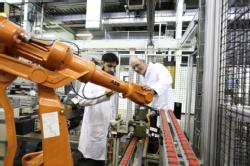 It was announced today Wednesday 9th September 2015 that WMG, at the University of Warwick, will lead a £14 million consortium to create a new automotive battery pack manufacturing research centre. The project will help develop the next generation of traction batteries for electric and hybrid vehicles. It will combine the best human and automated assembly methods to manufacture battery packs and lay the foundations of a new UK automotive supply chain based around this technology.
It was announced today Wednesday 9th September 2015 that WMG, at the University of Warwick, will lead a £14 million consortium to create a new automotive battery pack manufacturing research centre. The project will help develop the next generation of traction batteries for electric and hybrid vehicles. It will combine the best human and automated assembly methods to manufacture battery packs and lay the foundations of a new UK automotive supply chain based around this technology.
WMG hiring 120 new positions over next 100 days
 The continued success and growth of WMG, at the University of Warwick, now means that it is seeking to hire 120 new recruits over the next 100 days.
The continued success and growth of WMG, at the University of Warwick, now means that it is seeking to hire 120 new recruits over the next 100 days.
WMG is a leading centre for world class education and applied research in many sectors including: automotive, aerospace and defence, business, construction, energy and utilities, IT, security and rail. They have recently won funding for several major research projects and partnerships that builds on our large array of collaborations with new and established partners.
WMG’s Chairman Professor Lord Kumar Bhattacharyya said:
As we continue to grow and expand we are seeking individuals who thrive on a challenge and who aren’t afraid to defy conventional thinking. We are investing in, and creating, several new world-leading facilities to support these new projects. So we also need to invest in more talented people to take these projects forward and we will intend to recruit 120 of those people in the next 100 days.”
Some of the most recent developments, at WMG include a new £13.5 million Energy Innovation Centre and the £150 million National Automotive Innovation Centre.
£4.2 million for world’s most adaptable driving simulator to research driverless cars
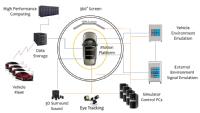 WMG at the University of Warwick have been awarded £3.2 million by The Engineering and Physical Sciences Research Council (EPSRC) to create one of the world’s most adaptable and advanced driving simulators. Support from industry including a further £1 million of funding has been gained to begin research projects with the new technology led by research students embedded in JLR, bringing the total cost of the simulator and its research programme to £4.2 million.
WMG at the University of Warwick have been awarded £3.2 million by The Engineering and Physical Sciences Research Council (EPSRC) to create one of the world’s most adaptable and advanced driving simulators. Support from industry including a further £1 million of funding has been gained to begin research projects with the new technology led by research students embedded in JLR, bringing the total cost of the simulator and its research programme to £4.2 million.
In its first phase the simulator will be tested and piloted in WMG’s International Manufacturing Centre before moving to its final home in the National Automotive Innovation Centre (NAIC).
The simulator, which will be available to a range of research groups, will use a LIDAR scan (a high resolution laser scan of a real driving environment) of 30 miles of real roads around the City of Coventry to test vehicles in the simulator. While the simulator will use a fixed test car for many tests it will also be configured so that any make of car can be driven into the simulator for testing which is believed to be a unique capability for such an advanced simulator.
Warwick named as Electrical Energy Storage Spoke in £1 billion Advanced Propulsion Centre
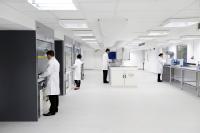 The University of Warwick has today been named as the "Electrical Energy Storage Spoke" of the government and industry funded £1 billion Advanced Propulsion Centre (APC), to co-ordinate a technical community with a shared interest in battery systems.
The University of Warwick has today been named as the "Electrical Energy Storage Spoke" of the government and industry funded £1 billion Advanced Propulsion Centre (APC), to co-ordinate a technical community with a shared interest in battery systems.
The Automotive Council has identified electrical energy storage as a key technology for the future of the automotive industry in the UK. WMG, at the University of Warwick, has made significant investments over the last 10 years to build expertise and facilities in the scale-up and evaluation of battery systems. As a result of these investments, and a strong network of academic and industrial partners, The University of Warwick has been identified as the logical location to host the Electrical Energy Storage Spoke for the APC.
Call for Papers - WMG Doctoral Research and Innovation Conference
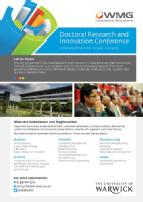 The 2nd annual WMG Doctoral Research and Innovation Conference, entitled ‘Innovation through Collaboration’, is an excellent opportunity to showcase research from both academia and industry across themes in design, materials, manufacturing, systems and business transformation.
The 2nd annual WMG Doctoral Research and Innovation Conference, entitled ‘Innovation through Collaboration’, is an excellent opportunity to showcase research from both academia and industry across themes in design, materials, manufacturing, systems and business transformation.
Organised by doctoral students, the conference will be held in the International Digital Laboratory on 30th June - 1st July, with an evening social event on the 30th.
Papers and poster presentations will take place across a wide variety of topics and awards will be presented in each theme.
Abstracts should be submitted online by 31st March.
